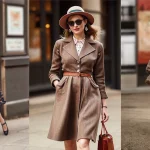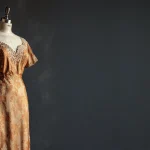Impact of Emerging Trends on Women’s Fashion in the UK
Women’s fashion in the UK is continuously shaped by emerging fashion trends UK that challenge and redefine traditional style norms. These trends often blend cultural influences with local preferences, reflecting a dynamic evolution within the industry. For example, the rise of sustainable and eco-conscious apparel has pushed UK designers to prioritize ethically sourced fabrics, influencing women’s fashion evolution beyond mere aesthetics.
Traditional British aesthetics, known for their classic tailoring and understated elegance, are adapting as younger generations embrace bold patterns, streetwear elements, and gender-neutral designs. This shift demonstrates how UK trend impact extends beyond runway innovation into everyday wardrobes, creating a balance between heritage and modernity.
Also to discover : What new fashion trends are UK women adopting this season?
Recent market insights reveal that over 60% of UK women aged 18–35 actively incorporate these emerging trends into their clothing choices, showing a clear appetite for experimentation paired with conscious consumption. This trend adoption is also supported by the growing digital fashion community, which drives rapid dissemination and acceptance of new styles.
In essence, the emerging fashion trends UK stimulate a vibrant style evolution. They not only respect but also reshape the women’s fashion evolution in the UK, signaling an exciting future for the industry that embraces both tradition and transformation.
Also to see : What Will Be the Next Big Trend in UK Women’s Fashion?
Influence of Sustainability and Eco-Friendly Fashion Choices
Sustainability has become a defining factor in shaping modern women’s fashion trends, especially within the UK. The surge in interest for sustainable fashion UK marks a shift from mere style towards environmental responsibility. Consumers increasingly prioritize ethical clothing UK, seeking garments made with transparent, environmentally conscious methods.
UK designers and retailers are responding by integrating eco-friendly style into their collections. This includes using organic fabrics, recycled fibers, or low-impact dyes, which reduce pollution and resource waste. Brands now emphasize production practices that minimize carbon footprints and support fair labor conditions. Such efforts position sustainable fashion UK not just as a niche, but a mainstream choice.
Consumer preferences continue to evolve, with many shoppers actively choosing brands that align with their values. The trend influences shopping habits; people are more likely to invest in quality pieces that last and less inclined towards fast fashion. This adoption of ethical clothing UK promotes circularity—buying less, choosing well, and reusing garments. Ultimately, sustainability and eco-friendly style are shaping the future of UK women’s fashion through conscious consumption and innovative design.
Technology Integration in UK Women’s Fashion
Technology’s role in UK women’s fashion is evolving rapidly, fueled by fashion technology UK innovations and digital platforms. Wearable tech is at the forefront, blending style with functionality. For instance, British designers incorporate smart fabrics that regulate temperature or monitor health metrics, creating pieces that are both chic and practical. This evolution transforms how women experience clothing daily.
Social media platforms amplify digital fashion trends, making the UK a hotspot for instant style inspiration and influence. Instagram and TikTok serve as stages where influencers showcase tech-enhanced garments, accelerating trends and consumer interest in wearable tech. This digital exposure supports brands in gathering real-time feedback and tailoring their product offerings to UK women’s tastes.
UK brands lead with pioneering launches and collaborations that highlight fashion technology UK. Emblematic cases include partnerships between tech startups and designers producing limited-edition collections integrating LED lights or augmented reality features. These projects exemplify the fusion of creativity and innovation, empowering consumers to engage with fashion beyond aesthetics. Exploring the intersection of wearable tech and digital fashion trends reveals a dynamic landscape where tradition meets cutting-edge technology, fostering endless possibilities for the future of UK women’s fashion.
Cultural and Global Influences Shaping UK Women’s Fashion
The UK’s women’s fashion scene is deeply enriched by cultural fashion influences UK stemming from its diverse population. This multicultural backdrop drives a fusion of styles that goes beyond traditional British design, blending elements from South Asian, African, Caribbean, and European communities. Such mingling creates unique aesthetics, reflecting an inclusive, ever-evolving wardrobe.
Global fashion trends also play a significant role in shaping UK women’s style. British designers frequently draw inspiration from international runways, incorporating textures, patterns, and silhouettes seen in cities like Tokyo, New York, and Paris. This cross-pollination energizes collections, ensuring UK fashion remains dynamic and relevant worldwide.
Multicultural style UK thrives not only in independent labels but within mainstream fashion too. Brands increasingly collaborate with international creatives, fostering innovation through shared cultural perspectives. These partnerships champion diversity, bringing fresh voices and ideas into the spotlight.
By embracing both cultural fashion influences UK and broader global trends, UK women’s fashion exemplifies adaptability and creativity. Its strength lies in celebrating diversity, making it a vibrant reflection of the country’s rich cultural tapestry.
Shifting Shopping Habits and Consumer Behaviour
The landscape of women’s fashion shopping in the UK is evolving rapidly. Increasingly, UK consumers show a clear preference for online shopping over traditional brick-and-mortar stores. This shift is influenced by convenience, wider product selection, and competitive pricing available digitally. Recent studies reveal a significant increase in online fashion purchases, with many UK women embracing digital platforms to stay ahead in trend adoption.
Consumer behaviour in the UK now heavily factors in social responsibility and transparency. Shoppers are scrutinising brands for ethical sourcing, sustainability practices, and supply chain openness before making purchases. This growing demand for accountability is reshaping how fashion brands operate and communicate with their audience.
Data from the UK indicates that fashion spending reflects this change: a larger portion of budgets is allocated to brands demonstrating eco-friendly practices and corporate social responsibility. Additionally, UK consumers are quicker to adopt new styles when they align with their values, revealing a direct connection between ethical considerations and trend adoption.
Understanding these shifting patterns is essential for brands aiming to capture and sustain the attention of the modern UK female shopper. Recognising that consumer behaviour in the UK is nuanced by digital access and ethical expectations helps predict future trends and spending habits accurately.
Expert Opinions and Future Outlook for UK Women’s Fashion
Fashion expert insights UK consistently emphasize the dynamic nature of the industry, highlighting how sustainability and digital innovation are set to redefine UK women’s fashion. Leading designers foresee a blend of classic British tailoring with eco-conscious materials gaining traction. This approach aligns with the broader UK fashion forecast, which predicts an increase in demand for versatile, sustainably sourced garments.
Future trends indicate that technology, such as AI-powered design and virtual try-ons, will become integral, enabling consumers to personalize styles more effectively. Experts note that this will not only enhance customer experience but will also drive faster adaptation to market shifts.
Key areas to watch include the integration of smart textiles that respond to environmental changes and the rise of gender-fluid fashion, reflecting evolving social attitudes. Analysts forecast that collaborations between traditional fashion houses and tech firms will accelerate innovation in the sector.
In summary, fashion expert insights UK paint a picture of an industry balancing heritage with innovation. The evolving UK fashion forecast suggests exciting developments that respond to consumer values while pushing creative boundaries. Staying informed through trusted sources ensures a comprehensive understanding of these influential trends shaping women’s fashion in the UK.










